Through Their Eyes: COVID-19 Chronicles with Isabella Angwenyi
persevering /pərsəˈviriNG/ adjective
– continuing in a course of action even in the face of difficulty, with little or no prospect of success, or despite a delay in achieving success
– See also: Isabella Angwenyi
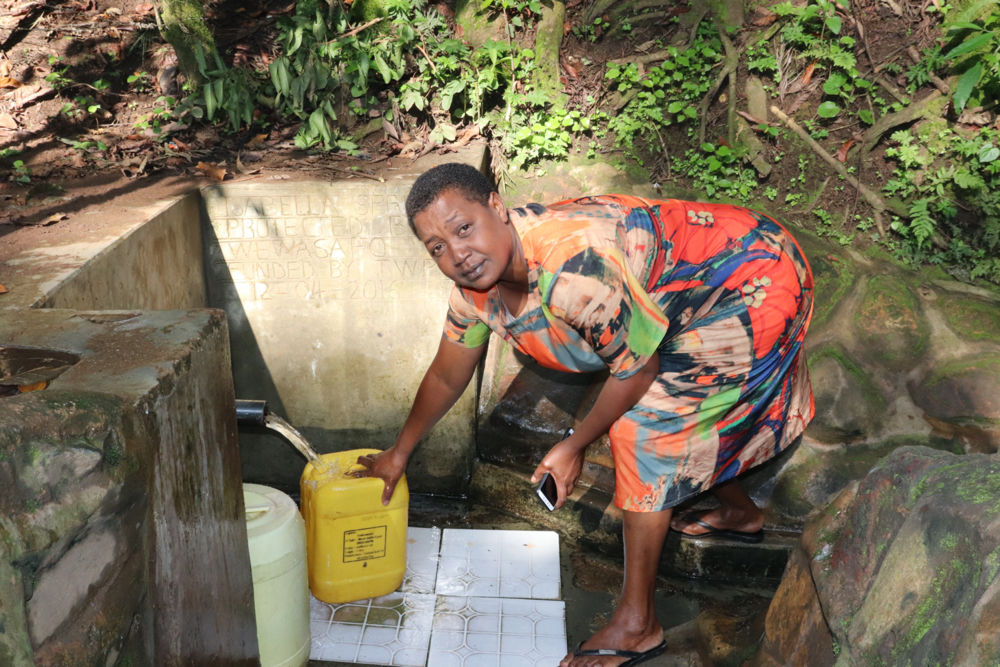
Isabella fetches water at her namesake spring.
Career. Family. Self-Owned Business. Community mobilizer.
At 50-years-old, Isabella Angwenyi is a do-it-all force to be reckoned with in her home of Shikhambi, Kenya. There, she depends on the protected spring of her own name, Isabella Spring, for all of her daily water needs.
In 2016, Isabella began her own soap business following the protection of her namesake spring. Clean water, as she will tell you, is a crucial ingredient to any quality soap. And she wants to ensure that safe, clean water remains the norm in Shikhambi. As a mother of 4 invested in not just her family’s health but also that of her community and business, Isabella serves as the treasurer of the spring’s water user committee.
The COVID-19 pandemic has forced Isabella to quickly adapt to limitations in business due to national and regional restrictions mandated by the Kenyan government to help control the spread of the virus. For Isabella, when the restrictions first hit, it was not a question of “if” but “how” she would find new ways to promote her sales and to help people have soap at home.
True to her character, Isabella’s story is one of determination, perseverance, and confidence that she and her community will get through these hard times.
Video Part 1: Water – Isabella shares how water from protected Isabella Spring has helped her family and community during the pandemic.
Our team recently visited Shikhambi to conduct a COVID-19 prevention training and monitor their water point. Shortly after, we returned to check in on the community, offer a COVID-19 refresher training, and ask how the pandemic is affecting their lives.
It was during this most recent visit that Isabella shared her story of how the coronavirus has impacted her life.
“Shikhambi community members are enlightened on COVID-19,” reflected Field Officer Ian Nakitare, who interviewed Isabella. “They are putting everything they were taught at the sensitization training into practice. By adhering to this, hopefully, the community will maintain its COVID-free status and good health in the long run.”
Ian met Isabella outside her home to conduct the interview. Both Ian and Isabella observed social distancing and other precautions throughout the visit to ensure their health and safety. The following is Isabella’s story, in her own words. Questions and answers have been edited for clarity and length.
Video Part 2: Soap Business & Training – Isabella shares how COVID-19 has impacted her soapmaking business, and what she found most valuable from our team’s COVID-19 sensitization training in her community.
“Since the installation of Isabella Spring, we have seen a noticeable impact on my community’s health. Cases of water-related diseases have highly reduced. A good number of community members benefited from the training held and have started small businesses in their homes. This has empowered them, and they can now save money and help their families.
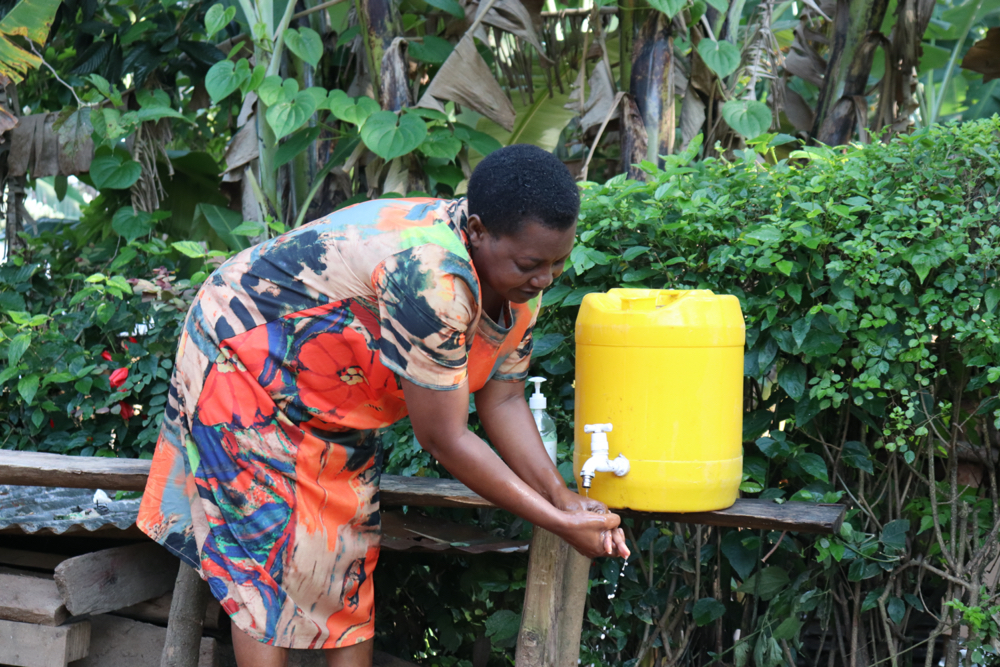
Isabella washes her hands with soap and water from Isabella Spring using a handwashing station she set up at home.
Readily accessible and clean water has helped me during this hard time of corona. My business of soap making requires a lot of water, and with the need for soap in handwashing, especially in combating coronavirus, I have had a number of orders to do.

Isabella pours her final liquid soap product into containers for sale.
We have adjusted to the restrictions set by our government, and we are practicing social distancing when fetching water. Sometimes we have to fetch water at odd hours to avoid crowding at the water point. I have personally invested in a pump and a tank storage system that helps me pump flowing water from the spring overnight to my home to complement my soap business.
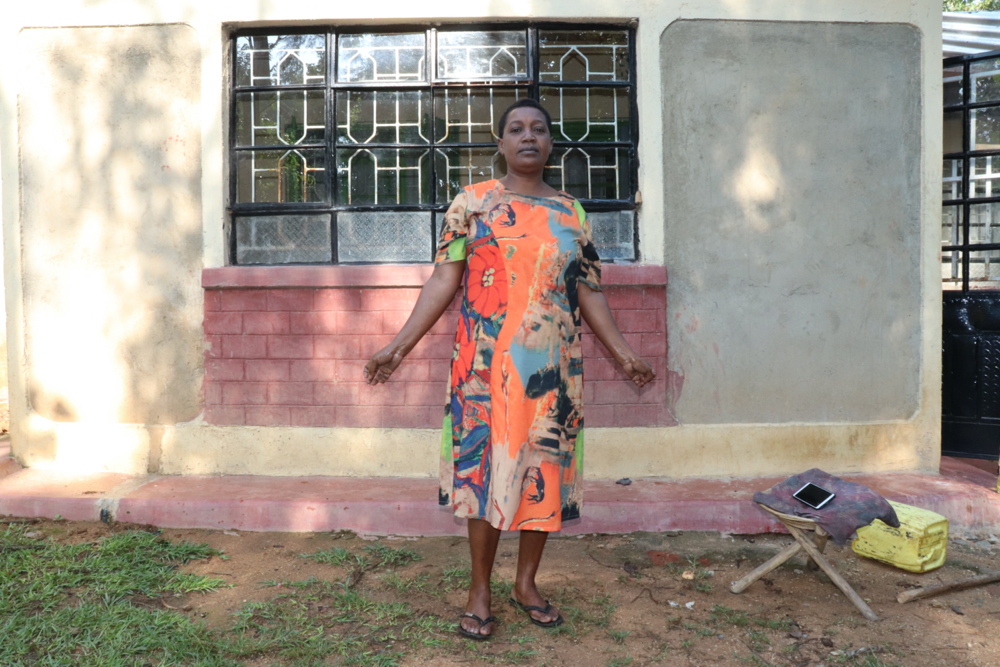
Isabella air-dries her hands after washing them to maximize the benefits of handwashing.
With schools closed, my children are at home most of the time. This requires me to check on them from time to time when I am at work. I have to ensure they are attending their Zoom classes and doing assignments sent to them from school. At times, especially on market days, Wednesday and Saturday, I take them to my workplace to help me make and sell soap.
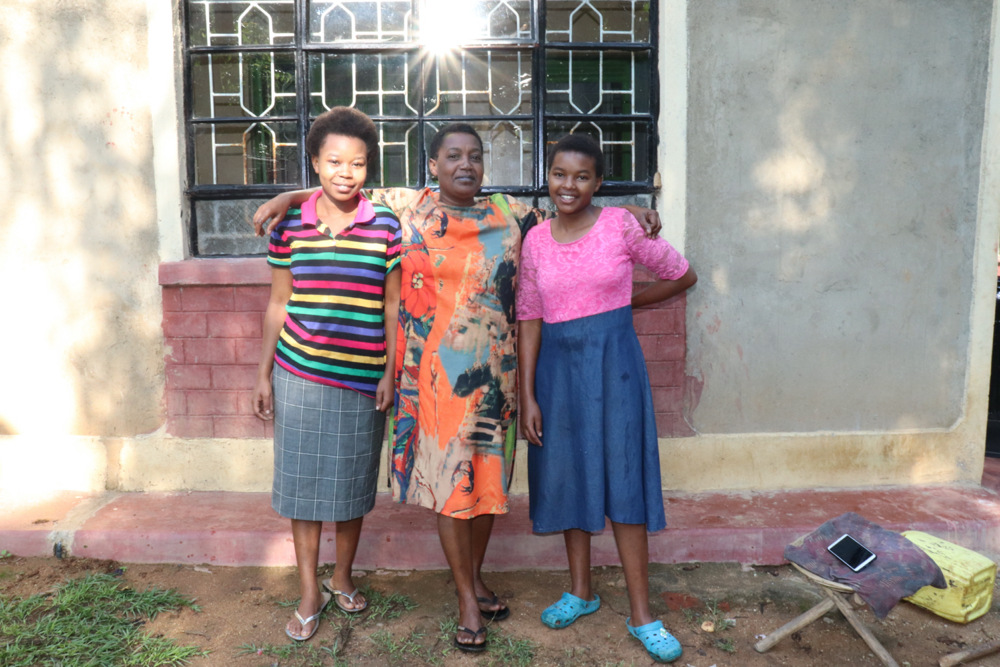
Isabella with her daughters outside their home.
My major customers, hotels, and schools, were closed down to minimize crowding. My sales for soap went down drastically, and I had to shift to sell chemicals used to make soap instead. The curfew hours and movement restriction set also don’t work well with my business as people are not free to come into town. This has become a challenge, and I have been forced to make deliveries to customers, which increases my overall production costs.
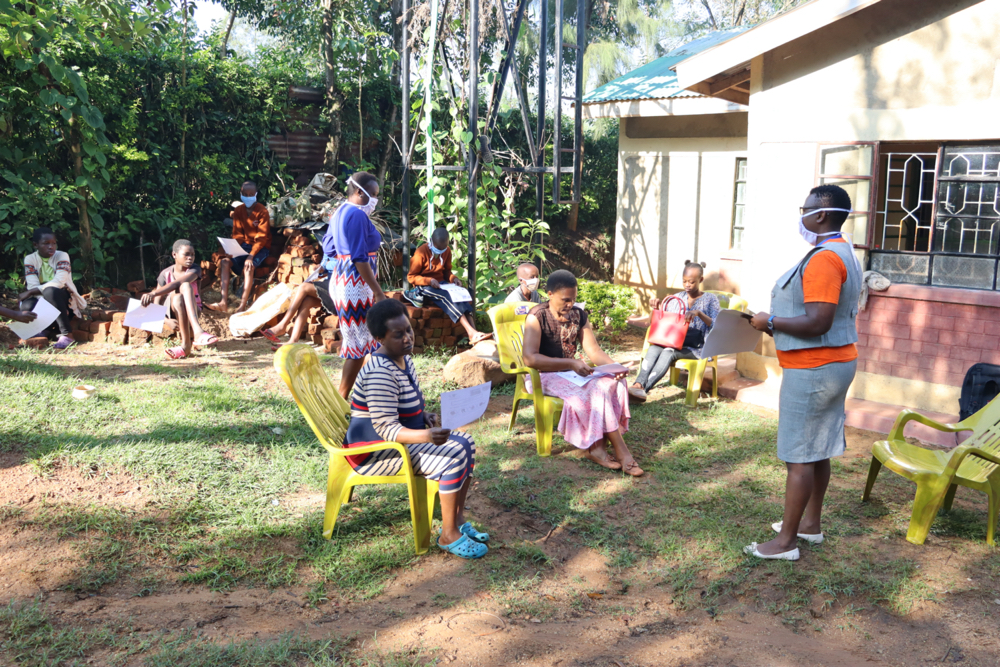
Isabella attends one of the first COVID-19 sensitization trainings we held in her community of Shikhambi.
We have made simple handwashing stations in the community where community members can wash their hands. I supply soap at a discounted amount to my neighbors to ensure they wash hands in the right way with soap and running water. We are now making our homemade cloth masks…and we are also coughing in our elbows to reduce the possibility of virus spread.
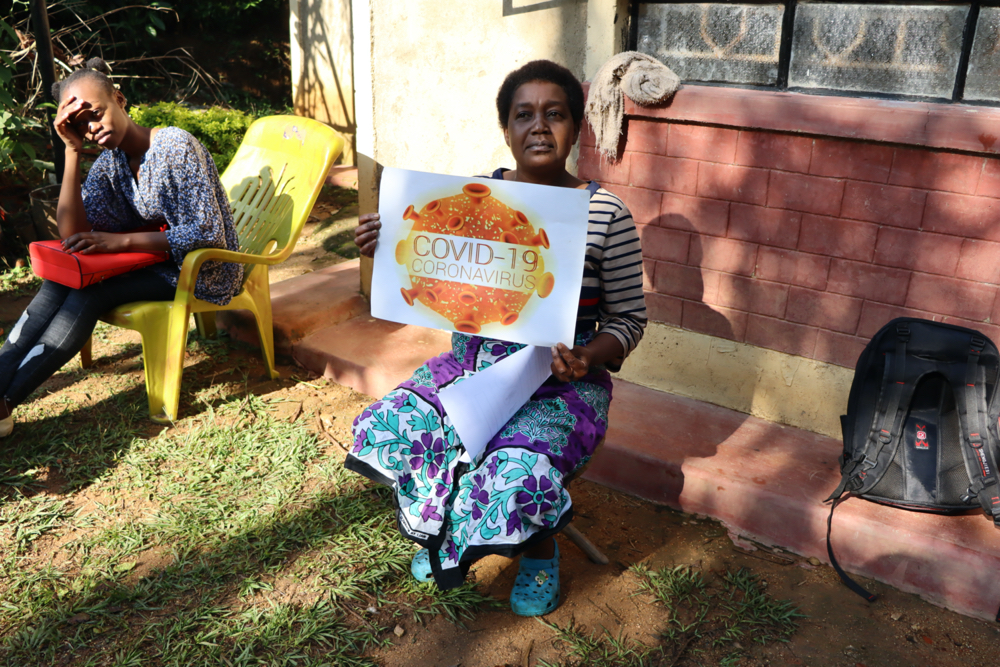
Isabela holds up a visual aid used in a demonstration about virus spread during training.
Like most governments around the world, the Kenyan government has set and adjusted several sets of restrictions both nationally and tailored to certain regions since the outbreak began to help control the spread of the disease.
What restriction were you most excited to see lifted already?
“The curfew time has been reduced by 3 hours. This has given us business people more time to do business and supply soap with no pressure.”
What restriction are you still looking forward to being lifted?
“Restriction of social gatherings. Kenyans are very social and friendly people – we miss our social gatherings! I really can’t wait for the government to open up churches so we can worship and praise God together as a family. I also miss going on family outings. Hopefully, we get back to normal soon.”
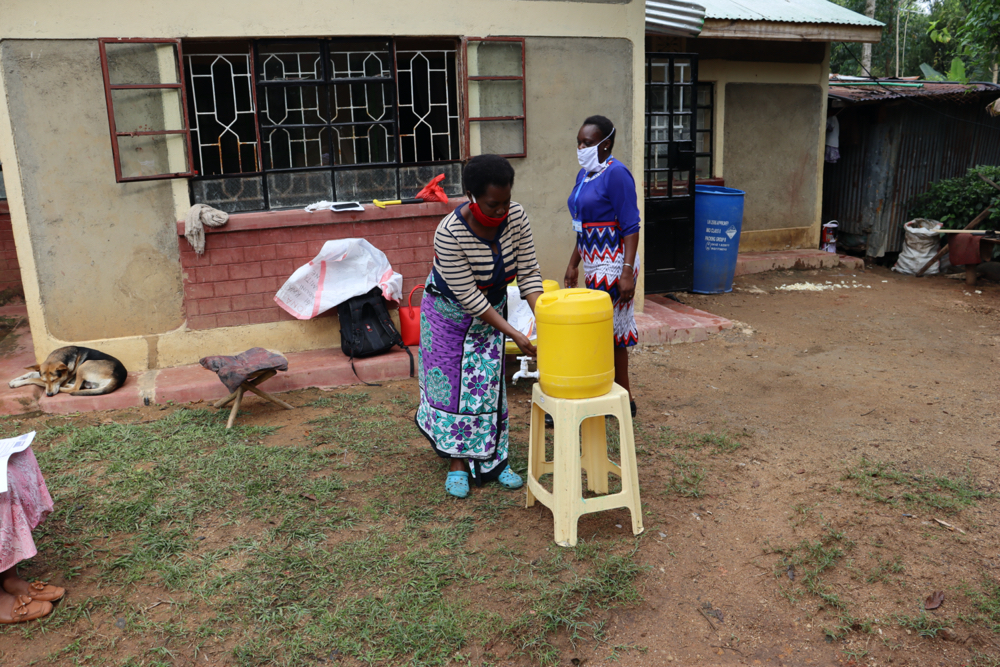
Isabella demonstrates good handwashing technique at training.
When asked where she receives information about COVID-19, Isabella listed the radio, television, loudspeaker/megaphone announcements, word of mouth, and our team’s sensitization training.
What has been the most valuable part of the COVID-19 sensitization training you received from our team?
“We were taught on improvising simple hands-free handwashing stations using locally available materials. This will go a long way in ensuring my community is safe from the coronavirus as most of the households have set up these stations and are constantly washing their hands with soap and running water.”
This post is part of a new series by The Water Project meant to highlight the perspectives and experiences of the people we serve and how the COVID-19 pandemic is impacting them. We invite you to read more of their stories here.
Home More Like ThisTweet